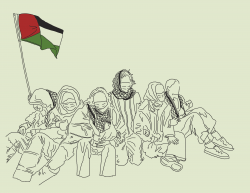Of all the tragedies in the wake of the War in Iraq, the refugee crisis is perhaps the least discussed. Two million Iraqis have relocated within the country and 2.2 million more have fled to neighboring nations. Our cover story this week focuses on one Iraqi who took the long road to become a Georgetown student, thanks in part to the admirable aid of University administrators. With all signs pointing to a troop withdrawal in the coming year, more and more Iraqis who worked with the U.S. or westerners in Iraq will be killed. Georgetown and other American institutions of higher learning should do their part to help bring as many of these Iraqis to the United States as they can.
It took a team of Georgetown administrators, including Assistant Dean Tad Howard and International Student Advisor Melanie Buser, more than a summer of work to get Sari Khalil (COL ‘10) to the University. The Georgetown team helped him with everything from obtaining his visa to ensuring that he received the right orientation materials, and they should be commended for bringing this talented young man to Georgetown.
Despite pressure from Congress, immigrant advocates and the United Nations, the United States has stringent limits on the number of visas offered to Iraqi immigrants. Halfway through this year, following a recent expansion in the annual quota from 50 to 500 visas, the U.S. had only given visas to 69 Iraqi translators, despite thousands on wait-lists in Iraq and other countries. Other Iraqis who didn’t work directly with the U.S. forces and allies are also at risk, especially those who helped journalists navigate the challenging landscapes of war as “fixers”—equal parts translator, logistical supervisor, reporter and protector. Some of these fixers are trying to come to American universities as graduate students in journalism.
Georgetown, as an international university, should reach out to more potential Iraqi students, sponsoring their student visas and aiding their travel and acclimation to the United States. Scott Fleming, Assistant Vice President for Federal Relations, could do some lobbying on the issue. Senior administrators could raise the issue in discussions with the leaders of other colleges and universities. While the government and all educational institutions must do their part, Georgetown—where Iraq war planners like former Undersecretary of Defense Douglas Feith and former CIA director George Tenet, have come to roost—owes a larger debt than most. Georgetown is better for having Kahlil as a student. The University would be even stronger if we used our resources to take the lead and reach out to other potential students in Iraq.




